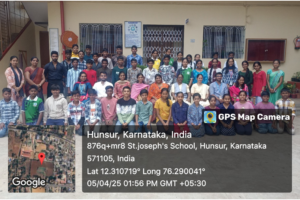FOOT STEPS TO MALGUDI
Report on Visit: Footsteps to Malgudi
The Department of English, St. Philomena’s College (Autonomous), Mysuru, organized a cultural and academic visit titled “Footsteps to Malgudi” on Tuesday, 30 September 2025. This event was a memorable initiative to immerse students in the imaginative world of R.K. Narayan’s Malgudi, the most celebrated fictional town in Indian English literature. The visit was hosted by the Vivekananda Institute of Indian Studies and inaugurated by Master Manjunath, who rose to fame as the child actor Swami in the classic television adaptation Malgudi Days.


The visit was designed not merely as an excursion but as a literary and cultural experience, where students could witness the recreation of Malgudi and its everyday life as described in Narayan’s stories. It bridged literature with performance, history, and cultural studies, thereby making the event highly relevant to English literature students.


The objective of this visit was to provide students with an immersive cultural and literary
experience of R.K. Narayan’s fictional world. It was also aimed at enhancing students’ appreciation of Indian English literature, connecting classroom learning with experiential knowledge, and understanding the recreation of a literary text in a socio-cultural context. As this visit is part of the academic syllabus, It helped in developing the students’ comprehensive understanding.


The visit began with the symbolic “Malgudi 0.0 km” signpost. Guided by Miss Asambhava, students were introduced to the setting of the fictional town. The recreation began with the train journey, a crucial symbol in Narayan’s works, where Vishal Master blew the whistle and flagged off the train with a green signal. This set the tone for an engaging and immersive journey.


Students then explored various landmarks, including the Albert Mission School, the railway station, and the engine room. Each of these locations reminded participants of episodes from Malgudi Days

The recreated village atmosphere was vibrant and lively, featuring cycle repair men, astrologers, vegetable sellers, coffee vendors, gold merchants, and post office staff. The astrologer’s booth, the Brahmin priest performing rituals, and portrayals of loan seekers and moneylenders highlighted the social dynamics that Narayan portrayed so vividly in his stories.

One of the highlights of the visit was the Malgudi Museum, which showcased rare and unique collections. Artifacts included traditional lamps, vintage household items, and playful materials reflecting the era of Narayan’s fiction. The museum also displayed paintings of Swami and other characters from Malgudi Days, evoking a strong sense of nostalgia among students.


Additionally, a wide collection of books, manuscripts, and old publications were exhibited, shedding light on the literary and cultural milieu of Narayan’s time. This museum became a space where literature, history, and culture intersected meaningfully for academic enrichment.

The revival of Malgudi was not only about remembering the past but it also demonstrated how fictional spaces can become cultural heritage. Malgudi, though imaginary, reflects the essence of South Indian towns and their values, traditions, and everyday struggles.
The dramatizations of villagers, markets, and rituals provided insights into Narayan’s skill at blending the ordinary with the extraordinary. By situating stories in an ordinary town, Narayan universalized Indian experiences for a global readership. This visit reinforced his contribution to Indian English fiction as a literature rooted in simplicity yet profound in message.
Students expressed great enthusiasm throughout the visit. Many felt that the recreation helped them connect more deeply with their coursework in Indian English literature. Several students noted how seeing Malgudi come alive through enactment clarified themes they had studied in class, such as colonial influences, social hierarchy, and cultural transformation.
The interaction with characters such as the astrologer, cycle man, and coffee vendor also encouraged students to reflect on the timelessness of Narayan’s characters. Though fictional, they resonate with real individuals and continue to remain relevant in contemporary society.
The visit to “Footsteps to Malgudi” was an enriching academic and cultural experience. It deepened students’ understanding of R.K. Narayan’s fictional creation and enriched their perspective on Indian English literature. The experience blended academic study with cultural exploration, proving to be highly engaging and informative for all participants. Beyond textbooks and classroom lectures, this journey into Malgudi reminded students that literature is a living, breathing reflection of society.
The visit will be remembered not only as an educational trip but also as a moment of cultural pride, celebrating one of India’s greatest literary figures and his immortal fictional town.



